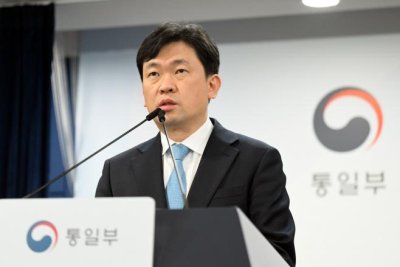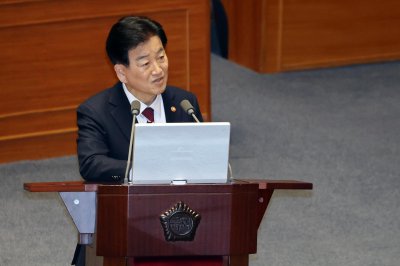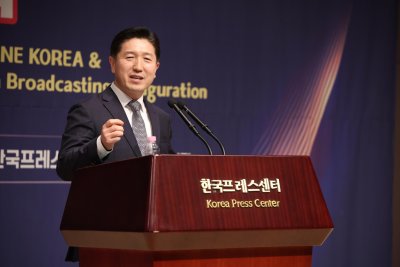1 of 2 | Seo In-taek, co-standing chair, delivers a vision at the launch ceremony of the Citizens’ Solidarity for One Korea on Feb. 4. Photo by the Citizens’ Solidarity for One Korea
Feb. 8 (Asia Today) — Leaders of a newly launched civic group advocating Korean unification said they plan to support private broadcasts to North Korea that emphasize what they call a “unification vision,” arguing that entertainment alone will not change attitudes in the North.
The Citizens’ Solidarity for One Korea, inaugurated Feb. 4, is promoting “Korea Link,” a global fundraising campaign to support broadcasting and related content distribution. Organizers said participants pledged about 80 million won (about $60,000) at the launch ceremony.
Co-representatives Seo In-taek and Kenneth Bae spoke with Asia Today about why they are pushing the initiative and how they plan to deliver content to North Korean residents.
Q: Why launch a private broadcasting push now?
Seo In-taek: “The government has halted broadcasts to North Korea, and the United States has also stopped funding Voice of America and Radio Free Asia. With balloon launches and maritime information activities also suspended, private broadcasts are effectively the only remaining way to deliver information to North Koreans.”
Kenneth Bae: “The immediate priority is to revitalize existing private broadcasts to North Korea. We need to strengthen what is already operating and broaden its reach.”
Q: What is ‘Korea Link’ and what is the core goal?
Seo: “‘Korea Link’ is not about simply sending outside information or South Korean dramas. The goal is to deliver a ‘unification vision’ – to present alternatives so North Korean residents can have choices.”
Bae: “The fund should first be used to support existing broadcasts, then to develop better content and expand the base so broadcasting becomes sustainable.”
Q: What format will the broadcasts take?
Bae: “I plan to appear on Far East Broadcasting to take part in broadcasts aimed at the North. We will start with shortwave radio, but we want to expand to medium-wave and internet-based broadcasting over time.”
Seo: “Shortwave is a start, but we should also look at practical ways to deliver content more widely, including digital storage methods.”
Q: How would you deliver content if internet access is restricted?
Seo: “There are several ways. Digital storage devices can be effective for information inflow, and we want to use such tools not only to deliver information but also to convey a unification vision. To do this consistently, we need a nationwide fundraising campaign.”
Q: How will raised funds be managed?
Seo: “If funds are secured, we plan to establish an operating committee to ensure the money is used transparently and effectively.”
Bae: “Funding should be tied to measurable improvements – stronger broadcasts, better content and broader distribution.”
Q: What kind of content do you want to send?
Seo: “Simply providing outside information is not enough. A unification vision is needed. South Korean dramas are mostly ‘chaebol stories.’ That kind of content alone will not change North Korea.”
Bae: “We need content that can stimulate interest in unification and keep that message consistent. If we keep producing and sending it, it can help widen support for unification.”
Q: Beyond broadcasting, what else do you plan to do?
Bae: “We will also advocate internationally for North Koreans’ right to know and right to access information.”
— Reported by Asia Today; translated by UPI
© Asia Today. Unauthorized reproduction or redistribution prohibited.
Original Korean report: https://www.asiatoday.co.kr/kn/view.php?key=20260209010002891





